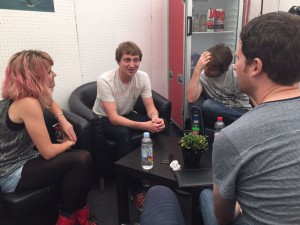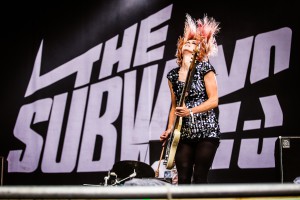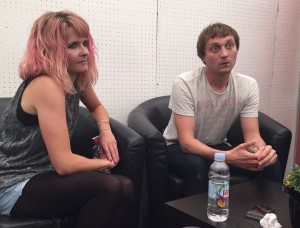
Few British bands can be seen so regularly on the German festival circuit as The Subways – and none of them seems to enjoy playing here as much as Billy Lunn, Charlotte Cooper and Josh Morgan do. Highfield Festival 2015 near Leipzig is no different: The Subways put on a great performance and show the audience, once more, that there is so much more to them than just Rock’N’Roll Queen. I meet the band an hour after their show in their dressing room where we talk about regrets, super producers, break-ups and sexist fans.
2015 is special for The Subways because it is 10 years since your debut album was released. Looking back at these ten years: What is your greatest achievement?
Billy Lunn: I think the greatest achievement is that we are still here ten years after (laughs). I know it’s a cop out answer, but we genuinely feel so blessed that we are still able to wake up in the morning and do what we absolutely love doing every single day. That we even got to four albums is absolutely incredible. I wouldn’t mind if we make it 8, 16, 32 records, I don’t know (laughs).
So you weren’t expecting being The Subways for so long when you started out?
Charlotte Cooper: You never have those kind of grand hopes. We were teenagers when we started doing this. The idea that we’d get to do the amount of stuff that we’ve done and the amount of places we’ve seen was never something we expected. It’s still a surprise.
Was there ever a point in your career when you thought that this might be the end of The Subways?
Lunn: Yeah. The second record was quite a difficult period, because Charlotte and I broke up and before we recorded the album I had to have surgery on my vocal chords because I had polyps. The doctor said: If the recovery process doesn’t go very well then you may never sing again. So, that was a very troubling time and a period when we thought: Wow, this might all suddenly come to a halt. But it didn’t. We went to the studio, we worked really hard and we realised that this band is the most important thing to us. We decided to do everything we possibly can to keep it together and keep making music – for ourselves, but also for our fans. I can’t imagine waking up in the morning and not having a bunch of people to play to. That’s a crazy idea.
What period of time did you enjoy most within these ten years? Is there a moment that you would like to freeze and stay in forever?
Lunn: The period when we first came over to Germany with our first record was really special.
Cooper: Yeah, playing festivals like Highfield and Open Flair. We had some big festival crowds and it was then that we realised that something was starting to happen. The fans here are very loyal. They’ve seen us ten times, and they’re still looking forward to it. It’s amazing to be back and still very special to us.
Why do The Subways work so good with festival crowds?
Cooper: I think it’s because we make being on stage a massive party. We have a really good time and everyone goes crazy. And that’s what festivals are all about. I’m like that at festivals, I want to lose any sense of responsibility and just go crazy. And that really works.
Do you watch other bands at festivals?

Lunn: Yeah. That’s a huge part of playing festivals for us. We tend to spend a long time on tour. And when it comes round to festival time we very rarely get to see other bands apart from the ones that we have on tour with us. So, we’re like: I’ve gotta go and see this band! I’ve gotta go and see that band, because I love their new record! That’s really important to us. Like Charlotte said: It’s a weekend geared towards everyone having fun and listening to music and being with people. Bringing people together, having a good time, falling in love, falling out of love, whatever. It’s like a microcosm of life. Whenever we’ve been to festivals, even before we made our first record or played in a band, we loved it. The idea of seeing these Gods on stage, up close, time after time! You were overwhelmed by the amount of incredible acts that you were going to see. That stayed with us very much.
Do you join the crowd if you watch other bands or do you watch from the side of the stage nowadays?
Cooper: I’m always out front. That’s just the thing for me, that’s the way to experience a show properly. I only watch from the side of the stage if I don’t have much time and I need to be back in our own dressing room in ten minutes or so.
You must get recognised.
Cooper: No.
Ah, come on.
Cooper: Really, hardly ever.
Lunn: You know, the great thing about being in this band is: We have people come to the shows, go crazy, sing our songs, crowdsurf and smile when we’re playing. And then off stage: No one cares. It’s absolutely amazing. We can go out with our families, Josh with his daughter and with his girlfriend, I can go out with my wife, Charlotte can go out with her husband, and nobody notices, nobody cares. We’re so lucky. And it reminds us: We’re still very much three little kids from Hertfordshire who have got away with being able to play pop rock songs on stage for the last ten years. I think, when we come off stage we still have that mentality. That’s just us.
Is there anything that you regret looking back on the last ten years?
Cooper: I have a massive hippie thing about regrets. Sure there are things that maybe you are not proud of. But that doesn’t necessarily mean that you have regrets. Everything has happened, and that’s it. Maybe we wouldn’t be here playing at Highfield if we hadn’t done what we’ve done five years ago or whatever.
Lunn: I’m more pessimistic, I have tons of regrets (laughs). But I think Charlotte is absolutely right. Where we are in our lives now is an incredible place. I’m gonna stay with that.
Josh Morgan: I’m incredible. I regret nothing. (laughs)
Lunn: Josh is a God! (laughs)
2015 is also special because you released your fourth album which you produced yourselves. On your previous records you worked with some of the biggest names in the business: Ian Broudie, Butch Vig and Stephen Street. What is the one thing that you learned from each of them as a producer?
Lunn: With Ian Broudie it was about letting the mistakes stay in the mix. Not fuzz over things too much. I think, going back to your question about regrets, I fuzzed over that first album quite a lot. I put these two [Charlotte and Josh] through hell during that record. And I think I learned that lesson by the time we got to our second record: just to relax and let the music happen. That’s part of the joy of music and the personality of yourself and your musicianship.
How was working with Butch Vig on All Or Nothing?
Lunn: With him it was about planning. He was very highly motivated in the studio. Everything was in a table and as soon as we’d done something it was ticked off. We had a huge list of things to do on the album. Guitars for All Or Nothing? Tick! Guitars for Girls And Boys? Tick! He was very methodical. So I found out that being organised is also important. I think I took the fluidity of Ian Broudie and the organisation of Butch Vig and equalized that a little bit.
And in how far did Stephen Street influence your work?
Lunn: The main thing with Stephen Street is that he made us feel so comfortable. The studio isn’t the most natural environment for us. We like being on stage, we like the craziness of it, the sweating. Being in the studio is just a bit too technical and formulaic for us. He’d try and relax us.
So it doesn’t feel like going to work.
Lunn: That’s exactly it. Although we worked on a 9 to 5 schedule with him. Every day he would come in and talk about a book he just read or a film he’d seen. Or he would talk about football, because he is a big QPR fan, whereas Josh and I support Arsenal, Charlotte supports Sheffield Wednesday. We always had something to talk about. That gave us a sense of relaxation. Each producer had a kind of duality going on and we learned from all of them.
Having just seen your show, I have to ask: How do you cope with guys yelling sexist stuff at Charlotte during your performance?

Lunn: For us, the main thing is not to take the edge off the show. We try more often than not to keep things nice and pleasant. If that means putting someone down in a very jokey way, that’s the first measure. ‘We have an idiot over here, everyone clap the idiot!’ If someone directs some sexual aggression towards Charlotte, I tend to direct it towards me. ‘Someone wants me to take my top off!’ I think we’ve learned over the last ten years to just not get angry about it. Getting angry with people solves nothing. Mockery is the best form of progression and moving forward.
That’s a clever method. But I’m sure there are still situations when it’s not so easy to deal with.
Cooper: It bothered me a lot when I was younger. The only thing I don’t like nowadays, because there are so few female artists on stage at festivals like Highfield, is the pressure that is put on women in bands: You have to look great, be the most intelligent person, the most amazing bass player. No one puts that kind of pressure on men. I’m supposed to be a role model for strong independent women. But I’m not. I’m just a girl. On the other hand it inspires me. I can’t get away with playing shit. It pushes me.
Lunn: That’s the problem: The expectation is all on girls, but it should be on men. A huge part of feminism is for guys to shut the fuck up and take a step back. You know, I’m a feminist and I’m very outspoken. If I come across a girl who doesn’t necessarily hold the same feminist views as me, it’s my job to shut the fuck up and step back. Because otherwise I’m just another guy who’s telling a woman what to do. And we’ve had that for far too long.
Is the music business more chauvinist than others?
Lunn: In any case it’s up to festival organisers to take that pressure from women as well. It’s up to the radio stations to playing more rock band with females, it’s up to magazines. We play with so many great girls and they get no press at all. I tell magazines to do something about it and they tell me: ‘Then we’d be positively discriminating!’ Well, at least it’s positive! Look at the linkage with literary theory: We now look back on female authors and include them in the literary canon because they were ignored for so long. We need to do that in music as well, with Blondie, Bikini Kill, Hole, The Runaways. These are all forgotten rock stars. They are all so incredibly important. Chrissie Hynde! She’s one of the greatest rock stars of our time. Is she ever in the “30 greatest rock stars of all time” list in Kerrang! or NME? No. There are zero women. And that’s absolutely shit. It’s our job to make sure that women have a voice, that the women in the crowd are represented on stage, that they are inspired to get on stage. People see Charlotte rocking the bass like no one else does. And they start a band. We need to do that more.
